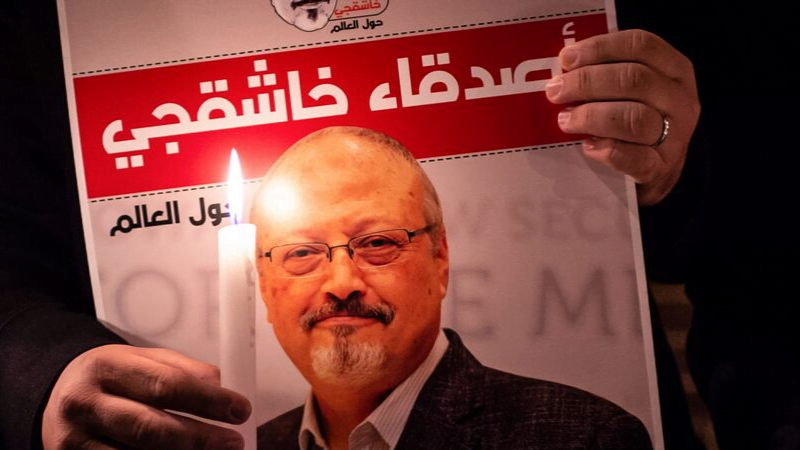One year ago, Saudi journalist Jamal Khashoggi walked into the consulate of Saudi Arabia in Turkey to pick up divorce documents that would allow him to marry his fiancee.
He was never seen again.
The Washington Post columnist was brutally murdered and dismembered in the Istanbul consulate in a killing that US intelligence services believe was executed by a team of Saudi operatives following instructions by the Crown Prince of Saudi Arabia.
His last words were “I can’t breathe,” according to an exclusive report released by CNN on Tuesday.
Several organisations such as Reporters Without Borders and the Committee for the Protection of Journalists marked the anniversary by protesting outside various Saudi Arabia consulates around Europe, while others held vigils – all calling for justice for Khashoggi’s death.
🔴Live / RSF laid dozens of dismembered shop window models outside #SaudiArabia’s consulate in #Paris today to mark Saudi columnist Jamal #Khashoggi’s murder exactly one year ago and to highlight the regime’s violations of media rights, which give it such a terrible image pic.twitter.com/3ybEW6T9yX
— RSF (@RSF_inter) October 1, 2019
Crown Prince takes full responsibility but denies ordering execution
After a year of denials, Crown Prince Mohammad bin Salman told CBS programme ’60 Minutes’ on Tuesday that as de facto Saudi leader, he bore “full responsibility” for the killing but denied ordering it.
When asked about how it was possible that he was unaware of the killing by Saudi officials, he said it was impossible for him to know “what three million people working for the Saudi government do daily”.
When pressed on what he meant by “taking responsibility” for the murder plot, the Crown Prince reiterated that the move was “a mistake”.
“It is shocking that one year has passed without justice for @WashingtonPost columnist #JamalKhashoggi. Saudi Arabia must not be allowed to cover up this murder and go about business as usual, detaining and harassing its critics." CPJ Executive Director @Joelcpj #JusticeForJamal pic.twitter.com/jlN3Arc8PI
— Committee to Protect Journalists (@pressfreedom) September 30, 2019
But in an interview with Reuters, UN expert on summary executions Agnes Callamard said the Crown Prince’s recent remarks were a “strategy of rehabilitation in the face of public outrage around the world”.
“He is creating a distance between himself, he is exonerating himself from direct criminal responsibility in the killing. He is creating layers, and layers and layers of actors and institutions which are protecting him from his direct accountability for the killing,” she said.
Secondly the Crown Prince takes great pains to distance himself from the killing, creating layers after layers of officials and institutions between himself and the execution of Mr #Khashoggi, suggesting they are acting like a buffer
— Agnes Callamard (@AgnesCallamard) September 30, 2019
Although the Saudi authorities admitted that Khashoggi met his death in the consulate, his body was never found. He died a painful death at the hands of 15 Saudi operatives who had flown into Turkey to execute him.
Khashoggi went into self-imposed exile in Turkey and had openly criticised the Crown Prince and his regime.
UN investigative report into Khashoggi’s death
Last June, Callamard presented a report that stated her investigation into his death found credible evidence warranting further investigation that the Crown Prince and other senior officials including key advisor Saud al-Qahtani are liable for the murder.
As part of her investigation, Callamard was given access to snippets of secret recordings by Turkish intelligence covering a few days before his murder up until his final moments. The operatives were heard joking around minutes before his brutal murder and laughing.
One year after his death, Callamard said she was “meeting resistance from within the UN”, largely from leaders determined to defend national sovereignty, for her proposal for a standing UN investigatory mechanism.
She called on world leaders to speak out about media freedom, saying that too many leaders were “instrumentalising” attacks on the press and said she wanted to stage a UN session on media freedom at the G20 leaders summit in Riyadh next year.
On the occasion of the 1 year anniversary of #JamalKhashoggi murder, lets remember #DaphneCaruanaGalizia murdered almost 2 years ago on 16 October 2017. The search for justice is still on. The hitmen have yet to be tried. The masterminds have not been identified #NotATarget https://t.co/6pUFNezs2o
— Agnes Callamard (@AgnesCallamard) September 30, 2019
This call was also picked up late on Tuesday evening by UK special envoy on media freedom Amal Clooney who said there was a “glaring gap” in the world’s ability to investigate targeted State killings of human rights defenders and journalists.
She praised Callamard and said she “had been forced heroically to manage a large-scale investigation with ridiculously few resources”.
Clooney said she expected a specialist legal panel, set up by the UK government and due to report soon, to champion a new standing UN investigatory mechanism into such killings.
In her report, Callamard had also said the Turkish investigation had been “seriously undermined” by the Saudis at the consulate and that “woefully inadequate time and access” was given to them which hampered their ability to carry out a professional crime scene investigation.
Callamard also had voiced her concerns over the legitimacy of legal proceedings in Saudi against 11 individuals facing the death penalty if found “guilty” of the journalist’s murder.












